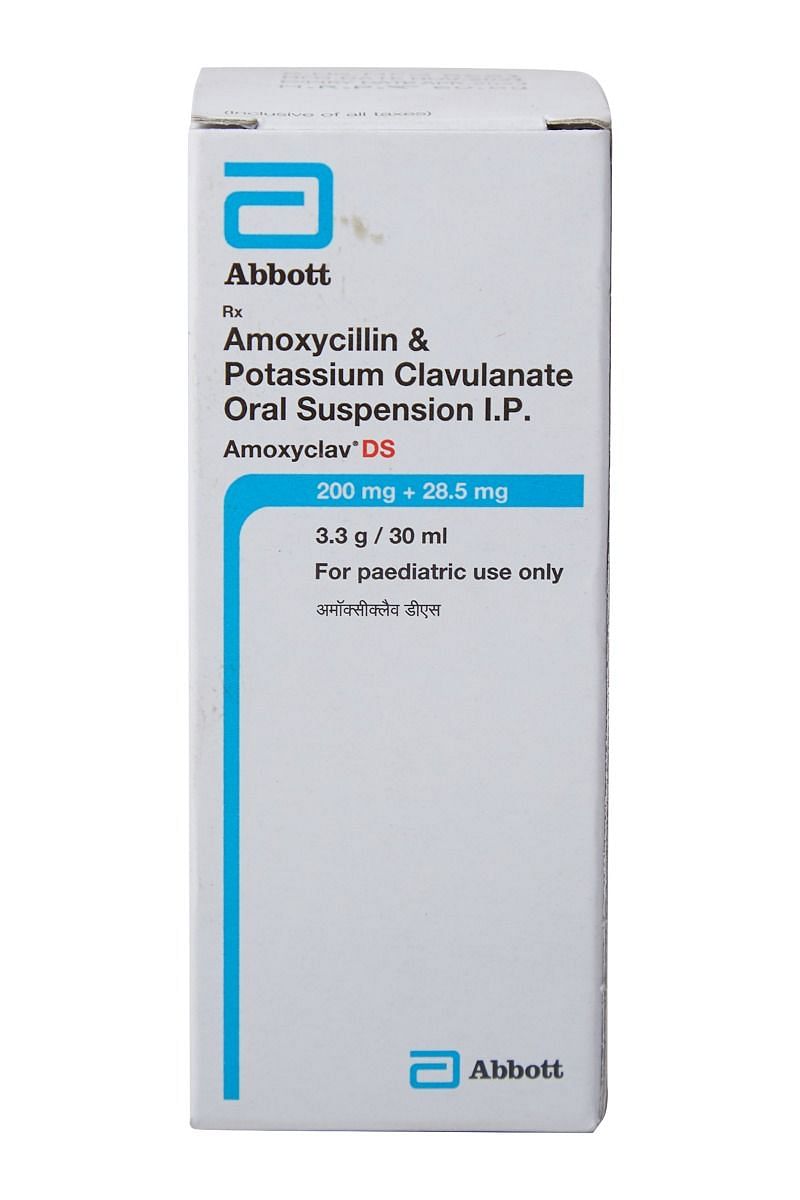
Biomentin Dry Syrup
Manufacturer
Supermax Laboratories
Salt Composition
Amoxycillin (200mg) + Clavulanic Acid (28.5mg)
Key Information
Short Description
Biomentin Dry Syrup is an antibiotic medicine that helps treat bacterial infections of the ear, nose, throat, chest, lungs, teeth, skin, and urinary tract.
Dosage Form
Dry Syrup
Introduction
Biomentin Dry Syrup is an antibiotic medicine that helps treat bacterial infections of the ear, nose, throat, chest, lungs, teeth, skin, and urinary tract. It is capable of killing bacteria that have become resistant to other therapies and thus also helps treat tuberculosis that is resistant to other treatments.
Directions for Use
Never give Biomentin Dry Syrup until and unless prescribed by the doctor. You must also never share your child’s medicine with anyone else even if they show similar symptoms.
Safety Information
Side Effects
No common side effects listed.
How it works
Biomentin Dry Syrup is an antibiotic. It has two active agents amoxycillin and clavulanic acid. Amoxycillin works by preventing the formation of the bacterial protective covering (cell wall) essential for the survival of the bacteria. Whereas clavulanic acid serves a special purpose of inhibiting an enzyme (beta-lactamase) that is produced by resistant bacteria. This makes the combination of amoxycillin and clavulanic acid an effective line of treatment for many types of infections.
Quick Tips
Your child may have a bitter taste in the mouth after the intake of Biomentin Dry Syrup. Eating citrus fruit or sipping plenty of water or fruit juice may help. Encourage your child to drink plenty of water in case diarrhea develops as a side effect. Never give Biomentin Dry Syrup to treat common cold and flu-like symptoms caused by viruses. Never save medicine for future illnesses. It cannot be said whether the same medicine will work on future infections. Check ‘expiry’ before giving Biomentin Dry Syrup to your child. Immediately discard all the expired medicines. Stop Biomentin Dry Syrup immediately if your child develops an itchy rash facial swelling or breathing difficulty. Report to the doctor without any delay.
Related Medicines

Moxikind-CV Dry Syrup

Advent 228.5mg Dry Syrup Tangy Orange

Amoxyclav Dry Syrup

Moxiclan CV Dry Syrup

Romox CL 200 mg/28.5 mg Dry Syrup

Havmox CV Kid Dry Syrup

Hibrid 228.5 Dry Syrup

Clavfit Dry Syrup

Granmox CV Dry Syrup

Alticlav DS Dry Syrup
Frequently asked questions
Can other medicines be given at the same time as Biomentin Dry Syrup?
Biomentin Dry Syrup may interact with other medications. It's crucial to inform your child's healthcare provider about all other medications they are taking before starting Biomentin Dry Syrup, including over-the-counter and herbal remedies. Always consult a healthcare professional regarding any medication use for your child.
Can I get my child vaccinated while on treatment with Biomentin Dry Syrup?
Generally, antibiotics do not interfere with vaccine ingredients or cause adverse reactions in children after vaccination. However, it's best to avoid administering a vaccine until your child is fully recovered from any underlying illness if they are taking antibiotics. Once the child feels better, the vaccine can be administered.
Which lab tests may my child undergo while taking Biomentin Dry Syrup on a long-term basis?
Regular blood and liver function tests may be required to monitor your child's condition during prolonged treatment with Biomentin Dry Syrup. Your healthcare provider will advise on the specific testing schedule.
Can I give a higher than the recommended dose of Biomentin Dry Syrup to my child?
Giving an excessive dose of this medicine may lead to increased side effects. If your child experiences worsening symptoms, consult their doctor for re-evaluation.
Can I stop giving Biomentin Dry Syrup to my child when the symptoms are relieved?
Never discontinue Biomentin Dry Syrup without consulting a healthcare professional. It's important to complete the full course of treatment, even if your child feels better, as symptoms may improve before the infection is fully eradicated. Do not stop using the medication unless directed by a healthcare provider.
Can the use of Biomentin Dry Syrup cause diarrhea?
Biomentin Dry Syrup can induce diarrhea as it is an antibiotic that eliminates harmful bacteria in the body. This might also disrupt the balance of beneficial bacteria within your child's stomach, leading to diarrhea. Encourage them to drink plenty of fluids if they experience this side effect. If their symptoms persist or worsen, contact their healthcare provider for guidance.
Do all viral common colds result in secondary bacterial infection?
In most instances, bacterial infections do not follow viral ones. Antibiotics should only be prescribed by a doctor after consulting with your child's doctor if there is suspected bacterial infection.
The mucus coming out of my child’s nose is yellow-green. Is it a sign of a bacterial infection?
A yellow or green mucus discharge from the nose is common during a common cold and does not necessarily indicate a bacterial infection. Keep in mind, normal mucus may change color from clear to yellow or green over time, often lasting for 7-10 days. If your child experiences any other concerning symptoms like fever, difficulty breathing, severe vomiting or diarrhea, or signs of dehydration such as dark urine or reduced urination frequency, it's essential to contact a doctor immediately.
Is there any sign which shows that my child needs immediate medical attention?
Seek immediate medical attention if your child exhibits symptoms like severe allergic reactions (difficulty breathing or skin rash), gastrointestinal distress (diarrhea), or signs of liver damage such as weakness, paleness, or vomiting. These are rare but serious side effects and require prompt medical intervention.


